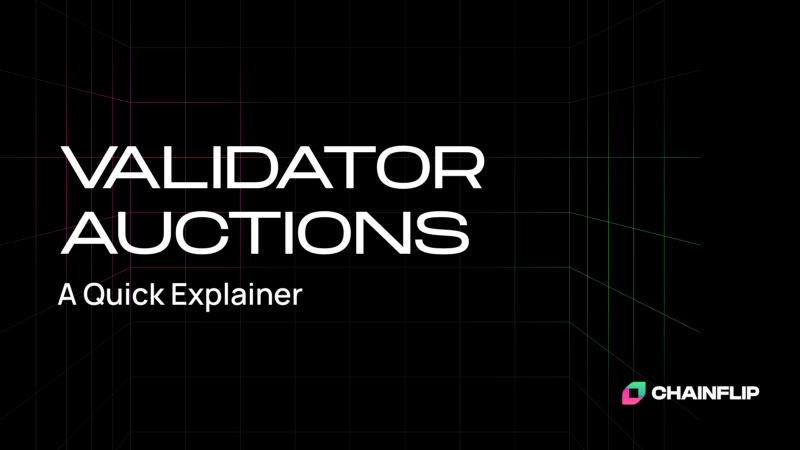Chainflip Validator Auctions — A Quick Explainer

We get a lot of questions about how the Validator auctions will work in Chainflip, so this post aims to clear up any confusion that might exist about them. If someone has questions about it, point them here.
It’s worth noting that this post is being released a while before Chainflip is live, so this information may be subject to change slightly. The general gist is likely to remain the same.
What is the Validator Auction?
Chainflip will be secured by 150 Validator nodes that can be run by anyone. These nodes collectively secure the state of the Chainflip internal chain (called the State Chain), as well as the capital in the system (Liquidity) provided by Liquidity Providers. In return for this, Validators will earn a reward from emissions.
It is essential that the parties running these Validators have a distinct stake in the network in order to disincentivise malicious cooperation. However, with limited slots due to scalability of multisignature signing algorithms, a method of allowing the market to set the price for these slots helps a lot. This is the role played by the Validator Auction.
The Validator Auction is a rolling 28-day Auction, whereby the highest 150 bidders at the end of each Auction are selected as the Validators for the next 28 days (1 Epoch). The price of a slot (the Minimum Active Bid) is thus the lowest bid out of the highest 150 bids.
In the initial Sandstrom release, Validator auctions will start with much shorter Epochs, with a 7 day rolling auction system in place.
How does it work?
Validators will place their bids on the Ethereum network with the ERC20 token FLIP. These bids are recorded by the current Validators via the witnessing process.
Bidding is a passive process, with Validators encouraged to lock the maximum they’re willing to pay for the slot with a single transaction.
If a Validator’s bid is higher than or equal to the Minimum Active Bid at the conclusion of an Auction, that Validator is then (assuming the key creation ceremonies go well) a part of the Active Set for the next Epoch. Any bid amounts locked beyond the Minimum Active Bid at the conclusion of an Auction can be withdrawn by the bidder.
If a Validator’s bid is lower than the Minimum Active Bid, their entire balance is redeemable after the Auction concludes.
In either case, any amounts not removed by the bidder will be considered as an implicit bid in the next Auction, including any rewards the Validator has earned from their node. This still means that current Validators might have to top up their bid between auctions to keep their slot, but if it’s high enough, do not need to do anything extra in each auction cycle.
How much FLIP will I need?
Given that the network is not live, it is impossible to answer this question with any finality. The prices of slots will also change from Auction to Auction, and thus there will never be a definitive answer.
Chainflip leaves any speculation about the amount of FLIP necessary for a Validator slot up to the reader. There will be 150 slots initially, and 90m tokens at TGE, and you can use those figures as a starting point to estimate the cost of a slot. If you expect 10% of tokens to be locked, then you’d expect it would be 10% of 90m FLIP/150 slots. If you expect 50% to be locked, then of course that figure goes up a lot. If you want to learn more about the economics of the FLIP token, consider reading the Whitepaper or the FAQ on our website.
Can I delegate my FLIP to another Validator?
No. The reason for this is that it removes the necessity for Validator node operators themselves to have a stake in the FLIP network. This makes their risk for attempting malicious cooperation much lower, as they’re gambling with other people’s stake and not their own.
It may be possible to provide other lockup incentives for FLIP in the future, but delegated staking for validators will likely remain out of the question.
Conclusion
Hope this clears up some common questions about the staking process. If you have any more questions feel free to ask them in the community Discord or Telegram groups.

